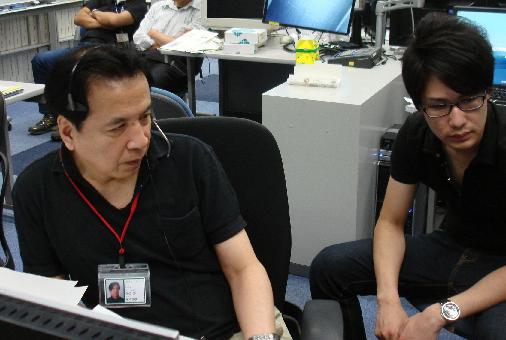This is an archive of information released in the past.
Disclaimer: It may contain broken links or outdated information. Some parts may not function in current web browsers.
*Visit https://humans-in-space.jaxa.jp/en/ for the latest information.

Experiment
- News
- Kibo Utilization Strategy
- Kibo Utilization Plan
- List of JAXA's Utilization Themes
- Experiment Facilities
- Space Environment Utilization
- Archive
"In-situ observation of growth mechanisms of protein crystals and their perfection under microgravity" has started
All times are Japan Standard Time (JST)
"In-situ observation of growth mechanisms of protein crystals and their perfection under microgravity*" has started using the Solution Crystallization Observation Facility (SCOF) on board Kibo, the Japanese Experiment Module (JEM). Growth rate of crystals is expected to greatly affect its quality.
*Principle Investigator (PI): Katsuo Tsukamoto, Professor, Tohoku University
On Monday, July 30, 2012, one of the crew on board the ISS installed the hardware exclusively made for this experiment to the SCOP and conducted the functional checkout. The first series of NanoStep experiments was started on Monday, 7:40 a.m. on August 6.
A total of three experiments is planned for NanoStep. The first series will last for about 35 days, from Monday, August 6 to Sunday, September 9, the second series will be for about 35 days, from Monday September 17 to Sunday, October 21, and the last third series will be for about 35 days, from Monday, October 29 to Sunday, December 1.
Many high quality proteins and perfection of crystals have been reported created on the International Space Station (ISS) and space shuttles so far. The reason for the high quality and perfection is considered that under the microgravity environment where there is no convection occurs, protein molecules are slowly crystallized (grows slowly).
However, the PI conducted a simple study and found by taking advantage of a Russian recoverable satellite that there is a case that the crystal grows faster in a microgravity environment.
The NanoStep aims to understand "why" the crystallization speed has increased by conducting a precise measurement of an in-situ observation so that the finding will be a guide to obtain high quality crystals on the ground.
Measuring crystal growth rate in space using a laser interferometer is the world's first experiment.
If the protein crystallization process under microgravity and the factors which hinder the crystal perfection are found, future similar space experiments will proceed smoothly. This is not limited to proteins, but the founding will enable the detailed analysis of the effects of impurities in the process of inorganic and organic crystallization which will lead to the improvement of crystal quality to be created on the ground.
【Remarks from PI, Katsuo Tsukamoto, Professor, Tohoku University】
We are thrilled with the fact that we are already able to measure the very slow crystal growth. Tremendous experimental data will be downloaded hereafter, however, since we have developed an image processing software, we will be able to analyze the data quickly and study the difference between ground and space.

Prof. Tsukamoto (left) monitors the experiment proceeding from the User Operations Area (UOA) at the Tsukuba Space Center (TKSC) (Credit: JAXA)
*All times are Japan Standard Time (JST)
| Copyright 2007 Japan Aerospace Exploration Agency | Site Policy |